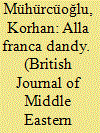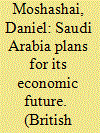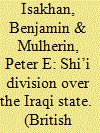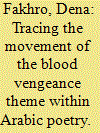|
|
|
Sort Order |
|
|
|
Items / Page
|
|
|
|
|
|
|
| Srl | Item |
| 1 |
ID:
176558


|
|
|
|
|
| Summary/Abstract |
In the late 19th-century Ottoman novel, an iconic character draws attention: the alla franca dandy; a man who admires the Western culture to the point of mindless imitation, and who stands aloof from his own society as he condemns the Ottoman/Islamic culture in aesthetical terms. He was born out of the Ottoman intellectuals’ ideas of and anxiety over Westernization, who sought to modernize the society without subverting the traditional foundations. As the Ottoman/Islamic and Western cultures collided, the alla franca dandy figure became the embodiment of Westernization gone astray and served the intellectuals’ objective to educate the masses by setting a bad example to be avoided. However, though the alla franca dandy figure was brought forth, in this manner, to circumscribe the proper limits of modernization, he ironically evolved, through the novels of different authors, to express individualistic attitudes, and put forth a modernist critique of the Ottoman/Islamic tradition as the intellectuals’ epistemological assumptions eroded and the society’s present is questioned and problematized as in need of intervention.
|
|
|
|
|
|
|
|
|
|
|
|
|
|
|
|
| 2 |
ID:
176554


|
|
|
|
|
| Summary/Abstract |
The first Tunisian provisional administration (TPA) formed in an ad hoc manner in the wake of President Zayn al-͑Abidin bin ͑Ali’s departure on 14 January 2011. Due to its nature as a first provisional administration (or interim government) as well as the constraints and circumstances it faced, the TPA confronted many challenges. This article discusses four main types of challenges with which it struggled: representation and legitimacy, state building and national identity, media and electoral reform and transitional justice and judicial reform. The ways the TPA dealt with these challenges had an impact on later phases of post-authoritarian governance. The article demonstrates the importance of studying initial decisions taken (and the constraints shaping them) during attempted transition from authoritarian rule.
|
|
|
|
|
|
|
|
|
|
|
|
|
|
|
|
| 3 |
ID:
176560


|
|
|
|
|
| Summary/Abstract |
This study examines various literary archetypes of social and political agency in popular Turkish fiction since the implementation of neoliberal economic policies (NLPs) in the 1980s. The extent to which NLPs have shaped notions of social and political agency is considered in the light of post-liberalization economic trends, and urban challenges facing Turkey today. It has been said that in Turkish literature, social and political actors must inevitably find self-transcendence either in self-imposed marginalization, or in quietist contemplation. However, we find in at least one case a new literary hero who points towards a more defiantly existential affirmation of freedom. What we suggest is that in A Strangeness in My Mind by Orhan Pamuk, the central character in the novel, Mevlut Karataş, is something of a departure. Mevlut must weather all the difficulties of the individual buffeted by NLPs, yet he endures unbowed if not undamaged. What emerges is a hero of today’s Turkey who has more affinities with Heidegger’s authentic Dasein than more traditional literary figures, who often are either impotent leftists or bourgeois aesthetes.
|
|
|
|
|
|
|
|
|
|
|
|
|
|
|
|
| 4 |
ID:
176559


|
|
|
|
|
| Summary/Abstract |
This article probes the return of the Muslim Brotherhood to prominence in 1970s Egypt through a systematic analysis of advertisements in the organization’s flagship periodical, al-Daʿwa (The Call). In every issue of the magazine, which was published between June 1976 and October 1981, entreaties to proper conduct and appeals to Islamic solidarity appeared alongside advertisements for everything from Pepsi to breakfast biscuits to automobiles. We utilize the methodological insights of social and cultural historians to the value of advertisements to cast new light on the reconstruction of the Brotherhood, its relationship with the diverse institutions comprising the Egyptian state, and on how the Muslim Brotherhood’s vision of piety both reflected and challenged a changing economic reality. Moving beyond a story of the Brotherhood’s return as a product of independent Islamist enterprise that had emerged due to both the Gulf oil boom and Egypt’s economic liberalization programme, significant public sector advertising in al-Daʿwa, especially prominent across the most valuable advertising real estate, underscores both internal divisions within the Egyptian state as well as the tangible ways that various state institutions were patrons of religious change.
|
|
|
|
|
|
|
|
|
|
|
|
|
|
|
|
| 5 |
ID:
176556


|
|
|
|
|
| Summary/Abstract |
In response to a rapid decline in world oil prices, Saudi Arabia’s Crown Prince Mohammed Bin Salman introduced a new economic blueprint called Saudi Vision 2030 and the accompanying National Transformation Plan that would enable the Kingdom to diversify its heavily oil-dependent revenue base, reduce its growing budget deficits, balance its budgets, and promote long-term economic growth. This article analyses the goals of the Vision and the policies offered to achieve them, which entail significant reforms to the Kingdom’s fiscal and budgetary procedures and policies. This study considers the political and institutional challenges that confront the Saudi Vision and its likelihood of success.
|
|
|
|
|
|
|
|
|
|
|
|
|
|
|
|
| 6 |
ID:
176555


|
|
|
|
|
| Summary/Abstract |
This article traces the evolving political platform of one of Iraq’s oldest and most powerful Shi’i political parties, the Islamic Supreme Council of Iraq (ISCI). Drawing on an analysis of 15 years of primary materials produced by ISCI, it focuses principally on their promotion of decentralization as a path towards peace and stability in Iraq. However, the article also traces the origins of a deep schism that emerged within ISCI between the movement’s old guard who were beholden to the Iranian regime and their model of vilāyat-i faqīh, and the youth-led Iraqi nationalist faction who wanted to see the instalment of a civil government without religious oversight. The article demonstrates that this division is indicative of a theological debate between Shi’i religious scholars over differing interpretations of the role of Shi’ism in politics. The article concludes by arguing that understanding the extent to which such esoteric religious debates manifest themselves politically is crucial to interpreting divisions within Shi’ism not just in Iraq, but across the broader Middle East.
|
|
|
|
|
|
|
|
|
|
|
|
|
|
|
|
| 7 |
ID:
176561


|
|
|
|
|
| Summary/Abstract |
Despite attention to Khomeini’s Guardianship of the Jurist (1970) and to Sunni iterations of maṣlaḥa, there is a dearth of Western scholarship on what Iranian scholars and journalists recognize as indispensable to governance in the Islamic Republic. With a comparative approach to modern perceptions of maṣlaḥa from inside and outside Iran, this article reveals a new perspective on how the outcome of debates in the earliest years of the Islamic Republic between the parliament and the Guardian Council went against the grain of traditional discussions on reconciling new laws with the shari‘a’s principles. Using academic literature, Sunni and Shi‘i jurisprudence, and, most significantly, one of Ayatullah Hashemi Rafsanjani’s (d. 2017) final interviews, this article shows that in these debates, Rafsanjani invoked the welfare of the state and national interest using the traditionally legal and limited concept of maṣlaḥa to justify new laws. Khomeini, on the other hand, re-imagined maṣlaḥa as necessary for Islamic Republic’s existence. Curiously, Khomeini’s re-imagining bears unexpected parallels with Jacques Derrida’s ‘supplement’, which, unlike maṣlaḥa, maintained human existence while the latter maintained political existence. Both maṣlaḥa and the supplement, however, provide a means and explanation for the defence of political and human existence during a real or perceived crisis.
|
|
|
|
|
|
|
|
|
|
|
|
|
|
|
|
| 8 |
ID:
176557


|
|
|
|
|
| Summary/Abstract |
Blood vengeance is a popular literary theme in classical Arabic poetry, particularly in elegies which lament a fallen hero and in the poetic cycles of folkloric epics. The poetic model for blood vengeance was established at least 1500 years ago, and persists to the present day. In this article, I focus upon the role that language plays in such rituals and, specifically, how the poetic speech act shapes memory and conditions behaviour. More recently, modern jihadist movements provide a political backdrop for newer poems, from across the Arab world, which contain the old blood vengeance message. My research traces the migration of this code through examination of a cross-section of Arabic poetry. Poetry belongs to a ritual complex, whereby a hymn of incitement provides an imperative for a bloody act. Moreover, rituals are legitimized by ancient myth, which not only ennobles blood lust, but is perpetuated by their repetition or reinterpreted over time.
|
|
|
|
|
|
|
|
|
|
|
|
|
|
|
|
|
|
|
|
|